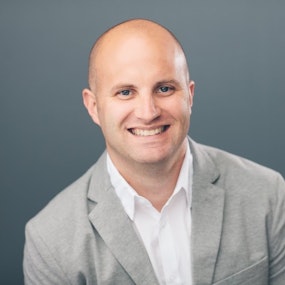The Hidden Revenue Stream You're Ignoring In Your Business with Grant Baldwin

If you’re an online business owner ready to reach more people with your message and marketing, but you’re unsure where to begin, this is the episode for you! In fact, you already have everything you need to grow a business, and today’s guest shares how you can harness it.
What is one marketing asset in your online business that you’re not currently tapping into? (HINT: You already have this in your possession!)
If you’re not sure what the answer is, this episode is where you need to be!
Today’s guest, Grant Baldwin is an expert at helping people share their meaningful messages with the masses as they also grow a business (he’s actually the one who gave me the courage to do this!).
BY THE TIME YOU FINISH LISTENING, YOU’LL LEARN:
- How to show up as a voice of authority as an online business owner
- The way to make your marketing content more engaging and relatable
- How to exponentially grow a business as you reach new audiences with your message
_____________
Liked this episode? Pay it forward and share it with a friend.
Love the show? Write a 5-star review — even one sentence helps us keep bringing you the content you want to hear.
More from Courtney:
- Website: theeffortlesslife.co
- Instagram: @thecourtneyelmer
Some product links on this site are affiliate links, which means we'll earn a small commission for any affiliate purchases you make (at no additional cost to you). We only recommend products that we use and/or personally trust, so you can browse with confidence.
All Rights Reserved | © The EffortLESS Life®
Courtney Elmer 0:00
Welcome back, you're listening to the AntiFragile Entrepreneurship™ Podcast, and this is episode 148.
[Intro]
Courtney Elmer 2:41
Now I'm joined today by someone who I have looked up to and admired for many, many years now. His name is Grant Baldwin, and he is a respected and highly sought after speaker podcaster author and an accomplished entrepreneur. He's the founder of the speaker Lab, which you might have heard about, you might have heard his podcast also called the speaker lab, where he's helped 1000s and 1000s of people build successful and sustainable speaking businesses. It's so awesome to have you here Grant.
Grant Baldwin 8:11
Thanks, Courtney Elmer, I really appreciate the kind words.
Courtney Elmer 8:15
I was thinking about a recent conversation that I had with one of our students and she said, "Courtney Elmer, something that you said to me recently that really struck me was that in order to be seen as a thought leader, I have to actually share my own thoughts. It sounds so stupid and so silly to actually hear myself say that out loud to you because I spend a lot of time consuming other people's content. I don't spend a lot of time sharing my own thoughts about that content, or my own thoughts and ideas with my audience." And I don't know about you, but I'm seeing this a lot lately, where people want to be seen as an expert. They want to be seen as a thought leader. They want to be seen as an influencer. But they're really struggling to step into their role as the voice of authority in their business. And I'm curious to hear why do you think that is?
Grant Baldwin 9:18
Well, I think everybody's dealing with some level of impostor syndrome Courtney Elmer. I think at the end of the day, like we're all doing our best, we're all making it up as we go. And there's days where you're like, hey, this is this is working, things are going well, and it's all clicking and there's you're like it's falling apart. And I don't entirely know why. But again, I think the important thing is like at the end of the day, like everybody feels some level of doubt and insecurity and fear and worry. I think like some of that a normal, like human emotion Courtney Elmer. I think part of being an entrepreneur is learning to manage those and knowing that, that some of those doubts may get quieter, they may get louder at times, but they're never going to fully go away. I think it's a reminder that you're human. And that's a normal emotion Courtney Elmer
Courtney Elmer 10:41
Do you still experience that self doubt?
Grant Baldwin 11:17
There's kind of a misconception Courtney Elmer, that if, let's say you get nervous before speaking as if that's a bad thing, I think that's a totally normal reaction. I think if anything, it's easy to confuse a nervous nervousness with like, adrenaline and excitement, right? So you think about kind of that feeling that you have before maybe go step on stage, or before you record a podcast before you have like some big meeting or important thing. And if anything, it's kind of the body's way of of heightening our senses, It's okay to feel some of that. But you don't you want to make sure it doesn't cross the point where it becomes debilitating and crippling, and it like completely, self sabotaging, right Courtney Elmer?
I think one of the best things that you can do Courtney Elmer, is to really make sure you spend the time to like practice and prepare and go over whatever it is that you're working on, like time and time and time again. So for example, you take speaking. But you think about like the best speakers on the planet, you think that sometimes that they scribble some thoughts on a napkin, and then hop up there, and then they'll magically works out like, it doesn't work like that, like they've spent hours and hours and hours behind the scenes, practicing, practicing, practicing. Because when you're creating a talk, you get up and speaking present, you're making an educated guess, I think this is funny. I think this will make sense. I think this will resonate. But I don't know, until you get up, and you're getting that real time feedback, are people smiling? Are they nodding at it taking notes? Are they paying attention? Are they looking at their phones, I don't know.
But based on that real time feedback Courtney Elmer, then you can make some adjustments and okay, that I thought that was going to work that didn't work at all, and you're making those adjustments. So each time you give some type of presentation, it gets better, and you start to gain some more confidence. But again, the point being is you should never whatever the big thing is that you're working towards or working on, you should never think like I'm gonna hop up there and hope it all works out like that. That's poor planning. I don't do that. It's lazy Courtney Elmer.
Courtney Elmer 14:18
I had a student recently who said "Courtney Elmer, I feel better when I when if I practice, if I prepare, then I get to the point where I'm now trying to be a perfectionist about everything, it's like I have a dot every I and cross every T and then if it doesn't come out right. I don't say the words exactly as I practice them, then I failed, and it kind of spirals downward from there." Talk to us about the benefits of practicing even if you feel like you're someone who can wing it.
Grant Baldwin 15:35
So it's kind of the difference between playing classical music and playing jazz, right Courtney Elmer? Classical is there and I'm not a musician at all. So roll with me on this one. But classical is like every single note is like it is all scripted out. And yeah, there's no like improvising or anything like that. Whereas jazz is more of a , we've kind of got our tempo, we've got a rhythm, we've got kind of our, our, what I'm trying to think of any other musical terms there. But then there's like some improvising and some kind of free flowing there. And there's room to breathe, right Courtney Elmer? And I think for us really, speakers of anything. I think that that's okay, , so when if you've ever seen like a speaker or a presenter, or podcasts or whatever, and it feels like every single thing that they say is like overly scripted, it's not relatable, it's hard to connect with, there's a big disconnect there.
Courtney Elmer, I always tell speakers, it's important to remember that as a speaker, you are a human talking to a collection of other humans. So act like a human. Anytime you've seen a speaker, and they're so deep in their own head that I say this, and then I take five steps over here. And then I do this with my hand at the end. It's so overly formulate or formulaic. It's like, ah, it feels off, right? So it's okay to have like those those moments of jazz where not every single word is going to be scripted, and I don't have to nail everything perfectly. I think it's okay to have jazz, but the idea of like, I'm gonna get up and wing everything, I do not recommend that at all. That's a horrible, horrible way to approach things.
Courtney Elmer 19:41
So what about for those people that are sitting here listening going, this is great, but I'm never going to speak from a stage that's not what I want to do. Is it still important for those people to still develop their skills as a speaker? In their business?
Grant Baldwin 20:08
A lot of times Courtney Elmer, we think of speaking as it's been kind of like these big keynotes are these big marquee events or that sort of thing. But the reality is, like we're always communicating as, as entrepreneurs, or as coaches or whatever it may be. And so whether you're having a one on one conversation with a client, or you're talking to a potential client, or you're doing a small group workshop, or you're speaking on a podcast, or you're recording some type of YouTube video, or Instagram reel, or whatever it may be, like you're always communicating in some way. And so being able to get put put cohesive thoughts together and kind of think through frameworks, and how do I best communicate this? What's the process that I take clients through, being able to like, articulate that in a clear and compelling way is important for any entrepreneur Courtney Elmer.
So for some people, they may want to say, I would love to be a speaker, I'd love to do a whole bunch of gigs. And that wanted to be a big part of my business and other people who may be watching our lessons. Like, I don't desire that at all, that's fine. I think one of the great things about speaking, is that, again Courtney Elmer, it's not like a one size fits all, where in order to be a speaker, you got to do , 50 gigs a year, and you always have to do them, , speak to this many people is like, No, you don't like there's people who are very successful speaking who speak 100 times a year or more, and some of them speak five times a year. And it's, again, it's not that one's better or worse than the other. But you get to decide what makes sense for you. But regardless whether you want to be a speaker or not, again, being able to clearly articulate and communicate your ideas to your audience, whatever that audience may look alike, is super, super important for for any entrepreneur Courtney Elmer.
Courtney Elmer 21:34
Can you tell us about a time maybe in your own business, or maybe with one of the clients you've worked with, where those peripheral benefits came into play and yielded a positive result? Right, like being able to communicate? Well?
Grant Baldwin 21:45
Yeah Courtney Elmer, so this is something where I do a lot of podcasts interviews. And so if I'm fumbling my way through, I'm not really sure what I'm talking about. But , several things we've talked about today are things like I've kind of processed or shared on other interviews before and kind of thought through like, okay, let's think about the, the difference between jazz and classical arts, some of these things are things that I've done before, where, again, when I present them now, it's probably in a slightly different way than maybe I've shared it before, but I've got a bit more confidence of going, Okay, we've talked about this for we've got a rough idea. And even like, the, like, the jazz, classical thing, like, I haven't talked about that in a while, but it's kinda like, okay, that makes sense. So sometimes, talking some of those things through helps you better articulate or better clarify what it is that you want to communicate or other ways that you can communicate to help other clients or whatever it is that you may be doing Courtney Elmer.
Courtney Elmer 22:58
For those people that are listening in to what we're speaking about here, okay, I hear what you're saying, grant, but I'm not a good speaker. Where do you usually start?
Grant Baldwin 23:54
Courtney Elmer, go back to one thing we touched on earlier that every speaker you look up to you admire your spec, you think, Oh, I'm never gonna be that good. And they either so articulate or funny, or charismatic, or whatever it may be. And like, I'm not, I'm not going to be that. But every speaker that you look up to you admire you respect, like, everyone started from zero.
Courtney Elmer, You were talking earlier about how sometimes there's this this feeling of I gotta have all the answers. I gotta have it all figured figured out. I got to know everything before even take that first step. So, for example, like when we're working with speakers, one of the challenges that they run into oftentimes is getting clear on who do you speak to and what problem you solve, because oftentimes, we want to spread that net as far and wide as possible. Who do I speak to as victims? As I speak to people, my message is for everybody, right? And what do I speak about? I don't know, what do you want me to speak about, I can speak about anything. It's like, well, we all know like, that doesn't work. So narrowing it down becomes difficult because you're trying to eliminate things and stay focused, and have that that like that perfect thing. But like, you don't know until you kind of get going Courtney Elmer.
And again, Courtney Elmer, I think that goes back to one thing we've touched on earlier that as a speaker, as a communicator, as a podcaster, as a coach, whatever you're doing, you're a human talking to other humans and so are the less polished you are overly polished, the more relatable and easier it is to connect with you than someone who's like way over scripted something,
Courtney Elmer 26:46
In the early in my business, I would do these videos. And if we were to go back and pull up one of those videos, we would have a good laugh right about now because those videos are me trying to be someone that I was not right. And it was this polished version of Courtney, that nobody could connect with. And until I started to undo the beliefs that were getting in the way of me actually showing up as who I am sitting here having a conversation with another incredible human, it was very difficult for me to gain any traction in my business because I was unknowingly preventing people from connecting with me, I wasn't letting them in. This is also why I really love podcasting, because you've got the beauty of editing. So you fumble if you say something that you didn't really come out quite right, you can edit it, but I feel like it's a wonderful place to hone your craft. Would you agree with that?
Grant Baldwin 28:17
Yeah Courtney Elmer. I've been interviewed, hundreds of times, I've recorded hundreds and hundreds of episodes. So again, it gives you those those reps that practice, right. And so the way that you get better as a speaker, as you speak, the way that you get better as a writer as you write the way you get better as a podcast with your podcast, right? So the more reps that you do have something over and over and over and over, the more you start to build some of that muscle memory of okay, this work that didn't work, and it helps you to become better over time Courtney Elmer.
And so yeah Courtney Elmer, there may be, let's take the, the jazz classical example we were talking about earlier, we may throw something like that out in a podcast and that little thought kind of marinates kind of circulates in my head for a little while. It's like, hey, let's , let's turn that into a training or let's do an our own episode on it, or let's, , flesh it out on a talk. And so, having a doing a podcast, again, whether you're interviewing or being interviewed, it's kind of a laboratory where you can try to experiment workshop and try different things and see what resonates. The challenge of the podcast is that as a speaker, you get that real time feedback. But as a podcaster. I mean, you and I are recording this at this very moment right now. But you may have , 1000s of people that are listening to this at some point, and we don't watch them we don't we don't we're sitting there like hey, can we watch you listen to this and see how you react what you respond to what you resonate with, right Courtney Elmer? And so there's some of this is kind of the after the fact feedback of going like I , hope this works. I hope this resonates I hope this makes sense. And you don't necessarily know but you start to build again, some of those reps and that confidence of kind of getting your own sense of what's working and what's not.
Courtney Elmer 29:54
Yes. Okay, so I'm curious, be honest with me. Was there ever a time where you You feel in your opinion that you walked on stage and you bombed it like you fell on your face something did not go the way that you thought it was going to be maybe something that you said didn't land quite right. And tell us a little bit about what that experience was and what you learned from it.
Grant Baldwin 30:15
Courtney Elmer, There are three factors that go into what makes a good speech and whether or not a speech is good. One is going to be you as the speaker. So were you prepared? Were you ready? So you're definitely a factor, Another factor is going to be the audience. And so if you are, let's say, you're speaking at a conference, and it's the last day of the conference, and everybody's tired, and you're the last speaker, and nobody wants to be there, it's gonna feel it's gonna feel a little off, right. So that's a factor.
A third factor Courtney Elmer, is going to be the environment. Meaning, oh, let me give an example. A couple years ago, I was speaking at an event in New Jersey, and it was in a room that set 2000 people. And so I do a keynote for 2000 people in this room that seats 3000 people, that's great. The room set for them. Right afterwards, they had me do a small workshop for about 50 people in the same room. Well, 2000 people in a room that see 2000 people is great, but 50 people in a room that see 2000 people is dead, right? So it's not like, Okay, we got a bad room here. So I'm gonna go through the motions to get get done, finish this up. But realizing like what are the things that you can control? What are the things that you can't control? And so there may be times where, like, a speech was a mess, and I felt like I did everything I possibly could. Or maybe there are times where like, a speech did not go well at all. And it was all on me. And it was, , I was the one that really dropped the ball. So, sometimes I did something, sometimes I didn't do anything. So there's a lot of variables that go into whether or not a speech actually works Courtney Elmer.
Courtney Elmer 33:36
Great. I'm really glad that you mentioned the distinction between recognizing what we can control and also what we can't, and not being hard on ourselves for the things that we can't control. Committing to showing up, giving it our best rolling with it whatever might happen. And walking away from it, knowing that you gave it your best and letting that be enough. I think there's a lot of relief in that.
Grant Baldwin 34:03
you can't control everything Courtney Elmer. I can't control the environment, but I can control what happens next time? And how do I handle that? And I think from like a speaker, or podcast or anything like that, I think like, when those random out of the ordinary things happen, I kind of like it. Because it's like this real raw moment. It's one of those things where it's like, oh, you had to be there, like this crazy thing happened, this dog ran around the room, it's kind of one of the things that like, breaks up the a normal presentation or a normal talk. So when something like that happens, I'm a big fan of those things. Someone has a loud sneeze or a cell phone goes off, like it increases raw, real shared experience.
Courtney Elmer 36:00
It's great to hear you say that it goes back to what you said, the very beginning is that you're a human speaking with humans.
Grant Baldwin 36:53
Yeah, yeah, absolutely Courtney Elmer. And yeah, whether, again, podcasting speaking, whether you're working with one person or 1000 people, you are a person doing your best helping a bunch of other people trying to do they're doing their best as well. And we're all doing our best
Courtney Elmer 37:27
That's all we can do. It has been amazing having you here today.
Grant Baldwin 38:05
Thanks so much Courtney Elmer.
Courtney Elmer 38:07
Coming up next week on the show, we're going to be talking about why you should focus on managing your energy and not your time during this holiday season. I'll see you back here next Tuesday and until then go live your EffortLESS Life®

Grant Baldwin
Founder/CEO
As founder and CEO of The Speaker Lab, Grant Baldwin has helped thousands of people build successful and sustainable speaking businesses. Over the last 15 years, Grant has become a sought-after speaker, podcaster, author, and accomplished entrepreneur. Featured on the Inc. 5000 list, Forbes, Inc. Entrepreneur, and The Huffington Post, he has committed his expertise and insight to equip others to share their meaningful message with the masses. His leadership and dedication to creating a one-of-a-kind organizational culture are evidenced by the impact of the team he leads.
Grant lives near Nashville, Tennessee with his wife, Sheila, and their three daughters.
For more, visit grantbaldwin.com.







